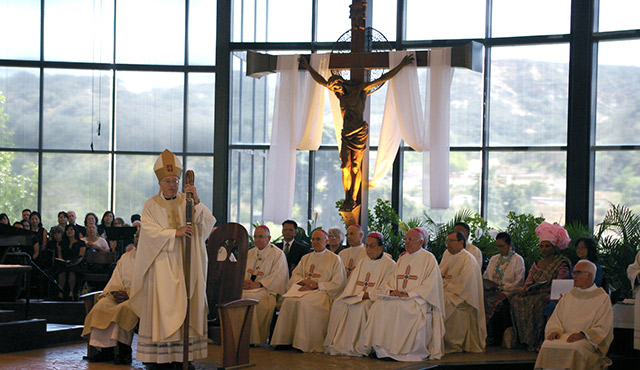CARMEL VALLEY, Calif. (CNS) — The Second Vatican Council teaches that the Catholic Church “is constantly on a pilgrimage toward the heavenly kingdom, guided always by the Lord,” San Diego’s new bishop said at his installation Mass at St. Therese of Carmel Church.
“This image of the church as the pilgrim people of God demands that the ministry of a bishop be enmeshed in a culture of mutual accompaniment that suffuses the local church,” Bishop Robert W. McElroy said in his homily April 15.
“The theological foundation for this culture of mutual accompaniment lies in the priesthood of all believers and the universal call to holiness,” he said.
For the disciples of the Lord, their most important religious identity is not found “in any particular office that they hold, or any status in orders or consecrated life, but in the grace of baptism which brings membership in the church,” Bishop McElroy said. “St. Augustine expressed this reality clearly: For you, I am a bishop; with you, I am a Christian.”
Bishop McElroy, a native of San Francisco, is the sixth bishop of San Diego. He succeeds Bishop Cirilo B. Flores, who died Sept. 6, 2014. He was an auxiliary bishop of San Francisco when Pope Francis named him to head the Diocese of San Diego in March. Bishop Flores formerly was an auxiliary bishop of the Diocese of Orange.
Archbishop Jose H. Gomez of Los Angeles installed the new bishop during the Mass in Carmel Valley. Archbishop Carlo Maria Vigano, apostolic nuncio to the United States, was present, as were Cardinal William J. Levada, former archbishop of San Francisco and a former Vatican official, and Cardinal Roger M. Mahony, retired archbishop of Los Angeles.
Many of Bishop McElroy’s brother bishops and priests from both the Diocese of San Diego and the Archdiocese of San Francisco were in attendance.
Near the beginning of the liturgy, Archbishop Vigano read the apostolic mandate from the Vatican appointing Bishop McElroy as San Diego’s bishop. The apostolic letter was then formally presented to the diocesan chancellor, Rod Valdivia, and then to the college of consultors and the people of San Diego.
Bishop McElroy, who was at first seated in a solitary chair immediately in front of the first pew, was then led by Archbishops Gomez and Vigano to a seat in the sanctuary, symbolizing the taking of his rightful place as the new diocesan bishop.
As a gesture of welcome, selected representatives from the diocese approached the new bishop to greet him. These included representatives from the Hispanic Commission and the Filipino, Vietnamese, African-American, Tongan and Irish communities, as well as the armed forces, Catholic universities, consecrated life and the diaconate community.
“Accompaniment” was an overarching theme of Bishop McElroy’s homily, which he opened by describing the feat that two free climbers, Tommy Caldwell and Kevin Jorgeson, accomplished. They scaled the most challenging side of El Capitan in Yosemite National Park, reaching the top in 19 days, from Dec. 27 to Jan. 14. As free climbers, they used no ropes — just their bare hands and sticky-soled shoes.
Bishop McElroy noted that Jorgeson struggled more than Caldwell and knew he was holding up his climbing partner, especially at one especially difficult point, but “Tommy made clear that he would never abandon his friend.” They made it to the top together.
“The grace of mutual accompaniment. This was the real miracle that occurred on El Capitan in January of this year,” the bishop said. “And it is this grace of mutual accompaniment that must form the heart of the relationship of a bishop with his local church.”
“Pope Francis has movingly described the elements of Christian accompaniment: It is rooted in a sense of the sacredness of the other and requires a continual stance of listening,” Bishop McElroy continued. “Accompaniment reflects the closeness and compassionate gaze of Christ which heals, liberates and encourages growth in the life of the Gospel.
“Accompaniment embraces prudence, understanding, patience and openness to the Spirit. Most importantly of all, mutual accompaniment demands a sense of collaboration among the bishop, the priests who are his primary collaborators, lay leaders, those in consecrated life and the diaconal community in a manner which deepens the unity of the people of God and increases the harvest of the Gospel within the local church.
Bishop McElroy said that as he begins his “ministry of service in this magnificent local church of San Diego, I pray that it will always be shaped by this vision of mutual accompaniment.”
“And I pray that this will be especially true in facing three central challenges which the Scriptures and the universal church place before us at this moment in the history of our diocese,” he added.
He said those three challenges are: proclaiming “the unlimited mercy of God”; always witnessing “to the grace of God which is present in the cultural diversity of the church”; and seeking “to be a builder of bridges in our contemporary world.”
“And as a builder of bridges, we must foster pathways both within and outside the Catholic community to rebuild the shattered civic and political unity of our nation, which is essential to the realization of the common good for our society and our world,” he said.

